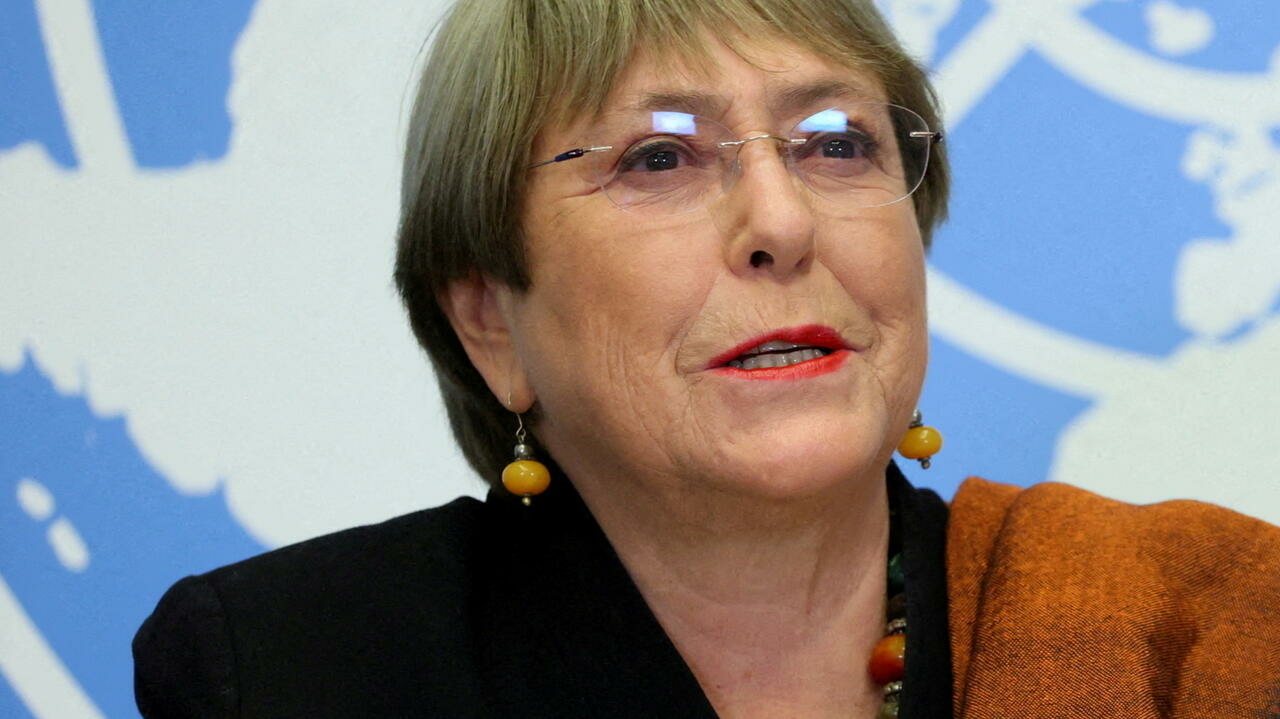
File photo: UN High Commissioner for Human Rights Michelle Bachelet attends an event at the United Nations in Geneva, Switzerland, November 3, 2021.
China has called a mission by the UN rights chief a chance to “clarify misinformation” ahead of her visit on Tuesday to Xinjiang as Uyghurs warned a public relations stunt may lie in wait.
Advertising Read more
The ruling Communist Party is accused of detaining over one million Uyghurs and other Muslim minorities in the far-western region as part of a years-long crackdown the United States and lawmakers in other Western countries have labelled a “genocide”.
China vehemently denies the allegations, calling them the “lie of the century”.
Michelle Bachelet is expected to visit the Xinjiang cities of Urumqi and Kashgar on Tuesday and Wednesday as part of a six-day tour.
She met Foreign Minister Wang Yi who “expressed the hope that this trip would help enhance understanding”, according to a readout of the meeting released late Monday.
In its report of the meeting, state news agency Xinhua said Bachelet “congratulated China on its important achievements in economic and social development and in promoting the protection of human rights”.
Bachelet’s spokesperson did not confirm to AFP what was said outside the opening comments.
But Uyghurs, the main victims of an alleged campaign of repression, raised doubts about her presence if the trip is as highly-controlled as expected.
Nursimangul Abdureshid, a Uyghur living in Turkey, said she was “not very hopeful that her trip can bring any change”.
“I request them to visit victims like my family members, not the pre-prepared scenes by the Chinese government,” she told AFP.
Another Uyghur, Jevlan Shirememet, called on Bachelet to help him contact his mother who he has not seen for four years.
The Turkey-based 31-year-old — from the province’s northern reaches near the border with Kazakhstan — also said he hoped Bachelet would venture further than her itinerary.
“I don’t know why she can’t visit these places,” he told AFP.
‘Unfettered access’
Regional capital Urumqi is home to many of the government agencies believed to be behind the campaign China has described as a crackdown on religious extremism.
The city of four million has a sizeable Uyghur community and was the site of deadly ethnic clashes in 2009 as well as two attacks in 2014.
Kashgar — home to 700,000 people — lies in the Uyghur heartland of southern Xinjiang.
An ancient Silk Road city, it has been a major target of Beijing’s crackdown, researchers and activists say, with authorities accused of smothering the cultural hub in a high-tech security blanket while bulldozing Uyghur homes and religious sites.
The outskirts of both cities are pockmarked with what are believed to be detention camps, part of a sprawling network of recently built facilities.
Campaigners have voiced concern that Beijing will prevent Bachelet from conducting a thorough probe into alleged rights abuses and instead give her a stage-managed tour.
“We are very worried that this visit comes with few benefits for victims and activists, for a very high political cost,” said Raphael David from the International Service for Human Rights.
The US has said it is “deeply concerned” that she had not secured guarantees on what she will see, adding that she was unlikely to get an “unmanipulated” picture of China’s rights situation.
Bachelet on Monday gave assurances about her access to detention centres and rights defenders during a virtual meeting with the heads of dozens of diplomatic missions in China, according to diplomatic sources in Beijing.
Caroline Wilson, the UK’s ambassador to China, was on the call and tweeted that she stressed “the importance of unfettered access to Xinjiang and private conversations with its people”.
In response, China’s foreign ministry retorted Tuesday that London and Washington want to use Bachelet’s visit to “hype up so-called Xinjiang issues, and to smear and slander China.”
Bachelet’s office has also said she will meet with civil society organisations, business representatives and academics.
In addition to mass detentions, Chinese authorities have waged a campaign of forced labour, coerced sterilisation and the destruction of Uyghur cultural heritage in Xinjiang, researchers and campaigners say.
Leaked documents called the Xinjiang Police Files were reported by a consortium of media Tuesday — appearing to show thousands of photographs from inside Xinjiang’s system of mass incarceration, including many faces of detained Uyghurs.
The youngest was only 15 at the time of her detention, according to the reports.
Foreign ministry spokesman Wang Wenbin called the report “the latest example of anti-China forces smearing Xinjiang”.
Earlier this month, a leaked police database obtained by AFP listed the names and details of thousands of detained Uyghurs.
(AFP)
Daily newsletterReceive essential international news every morning Subscribe








